
Have you ever sat at a game table and thought, “Man, I just need some good luck”? Most of us have. That tiny little hope — that today might be your lucky day — it’s something people have believed in for centuries. And that’s exactly where the idea of the God of Gambling comes in.
It’s not just a myth or something made up in a casino. The belief in a gambling god has roots way deeper than you’d think. Let me walk you through it — not as a history lesson, but more like a story I’d tell over coffee.
So, rewind a few thousand years. In ancient China, people worshipped this dude called Caishen. He was the go-to guy for wealth. Like, if you were hoping for money or luck — especially with games — you'd light some incense and say a little prayer to him.
He wasn’t alone either. Over in Greece, people believed in Tyche, and the Romans had Fortuna. Both were goddesses who handled the whole “luck” and “fate” thing. You’d go to their temples, throw in an offering, and hope they’d nudge the dice in your favor. It was serious business back then.
Now, things got weird in medieval Europe. The church wasn’t a fan of gambling, and they made sure people knew it. Still, that didn’t stop folks from playing. They just went underground with it. Secret card games, dice behind closed doors — all that jazz.
And even though “gambling gods” weren’t in the spotlight, stories were floating around about magical creatures who controlled luck. Think of little mischief-makers like fairies or trickster spirits. They weren’t called the God of crypto Gambling, but they were close cousins, for sure.
Enter modern times — cue the lights, cue the casino bells. Places like Vegas and Macau turned gambling into a full-blown spectacle. Suddenly, it wasn’t just about luck. It was about style, flash, and high-stakes drama.
The funny thing is, even with all the tech and fancy tables, people still prayed. In Macau, they visit temples dedicated to Na Tcha, hoping for a win. In pop culture, we got phrases like “Lady Luck” and images of poker-faced heroes like James Bond making it all look easy.
And yeah, some folks still quietly thank the gods when their lucky number hits.
Let’s be real — gambling isn’t just in smoky rooms anymore. It’s on your phone, in your hand, 24/7. You can be in bed at 1 AM, playing online roulette with someone in another country.
But here’s the crazy part: that old belief? Still alive. People still keep lucky charms. They whisper things like “come on, lucky 7” before a spin. Whether they call it the God of Gambling or just good vibes, that little hope is there.
It’s simple, really. Life is full of risks — not just in crypto casinos, but in love, work, everything. Believing someone or something out there might help tip things your way? That’s comforting. It’s human.
The God of Gambling isn’t just a myth. It’s a feeling. A hope. Maybe even a little superstition we carry in our pocket when we chase something bigger than ourselves.
